|
|
|
Sort Order |
|
|
|
Items / Page
|
|
|
|
|
|
|
| Srl | Item |
| 1 |
ID:
161607
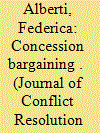

|
|
|
|
|
| Summary/Abstract |
We test experimentally whether dynamic interaction is crucial for concession bargaining. In our complete information bargaining experiments, two parties with asymmetric conflict payoffs try to agree how to share a commonly known pie by bargaining over a finite number of successive trials (agreement attempts). We compare the fully dynamic interaction to one less dynamic and one static protocol. In the quasi-dynamic protocol, later trials merely reveal that so far no agreement has been reached, and in the static protocol, no feedback information is given about earlier trials. We find that neither conflict rate nor efficiency or inequality of agreements differs across protocols. Comparing different numbers of maximal trials shows that more trials render conflict more likely due to less concessions.
|
|
|
|
|
|
|
|
|
|
|
|
|
|
|
|
| 2 |
ID:
161601
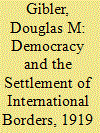

|
|
|
|
|
| Summary/Abstract |
There is increasing evidence that territorial conflict is associated with centralized and nondemocratic regimes. We explore whether this relationship is due to the facility of democratic regimes to settle their international borders. Using Owsiak’s data set on border settlement processes, we find little evidence that democratic regimes are more likely than other types of regimes to settle their borders. In fact, joint democracy rarely precedes the first border agreement or full settlement of the border, and there is almost no qualitative evidence suggesting a link between democracy and border settlement in the rare instances of successful agreements. Democracies are also not more likely to keep their borders settled or even to be more peaceful during settled-border years. Overall, our findings suggest that border settlements lead to peace in the dyad and affirm a clear temporal sequence of border settlement, then peace and democracy for neighboring dyads.
|
|
|
|
|
|
|
|
|
|
|
|
|
|
|
|
| 3 |
ID:
161608
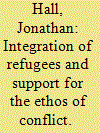

|
|
|
|
|
| Summary/Abstract |
Following forced expulsion and campaigns of ethnic cleansing, substantial portions of national communities affected by conflict no longer live within the boundaries of the state. Nevertheless, existing wartime and postwar public opinion research is largely confined to countries directly affected by conflict. As a result, current research may overlook important war-affected populations and processes shaping their opinions. I address this problem by examining the question: does incorporation in settlement countries reduce support for conflict ideology? Examining this question requires new microdata. I examine the results of a large-scale survey of ex-Yugoslavs in Sweden. The findings suggest that incorporation undermines support for conflict ideology by increasing the socioeconomic security and social identity complexity of migrants. This has important implications for multiculturalism policies in the context of the current global migration crisis.
|
|
|
|
|
|
|
|
|
|
|
|
|
|
|
|
| 4 |
ID:
161606


|
|
|
|
|
| Summary/Abstract |
Civil wars have a tendency to spread across borders. In several instances of conflict diffusion, however, conflicts spread well after their cessation at home. Whereas existing diffusion research has not attached much importance to this observation, I argue that these conflicts are instances of a broader pattern of postconflict diffusion. Wars are particularly prone to spread after termination because the end of fighting generates a surplus of weapons, combatants, and rebel leaders whose fortunes are tied to the continuation of violence. Some of these resources circulate throughout the region via the small arms trade and through transnational rebel networks, making this a time at which it should be easier for nonstate groups in the neighborhood to build a capable rebel army. The results from two complementary statistical tests on global conflict data provide strong support for such a postconflict diffusion effect.
|
|
|
|
|
|
|
|
|
|
|
|
|
|
|
|
| 5 |
ID:
161603


|
|
|
|
|
| Summary/Abstract |
Power transition theory (PTT) has had a progressive research program for more than half a century. In spite of this, one of its key concepts, satisfaction, has remained undertheorized. A compelling theory explaining why growth would make some states dissatisfied in the context of power transitions and others satisfied has not been articulated. It is argued here that satisfaction must be theorized at two levels of analysis: the global and the dyadic. The key to distinguishing satisfied versus dissatisfied states at the global level lies in specifically differentiating between the structural effects of changing power and the satisfying effect of increasing wealth. At the dyadic level, conflict over territory creates a perfect storm of state dissatisfaction. The study develops a theoretical framework for a multilevel understanding of satisfaction and its impact and tests it across politically relevant dyads from 1950 to 2001. The evidence strongly supports the hypotheses.
|
|
|
|
|
|
|
|
|
|
|
|
|
|
|
|
| 6 |
ID:
161605
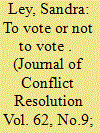

|
|
|
|
|
| Summary/Abstract |
Organized crime-related violence has important electoral consequences. Analyses of aggregate panel data on Mexican elections and an original postelectoral survey conducted in Mexico show that the strategic use of violence by organized crime groups during electoral campaigns demobilizes voters at large. Regions where criminal organizations attempted to influence elections and politics by targeting government officials and party candidates exhibited significantly lower levels of electoral participation. Consistently, at the individual level, results reveal that voters living in regions where organized crime engaged in high-profile violence were more cautious when deciding whether to vote or not. Prior research has focused on the role of crime victimization in nonelectoral participation, but the empirical evidence presented here suggests that the impact of a criminal context on turnout transcends personal victimization experiences.
|
|
|
|
|
|
|
|
|
|
|
|
|
|
|
|
| 7 |
ID:
161602
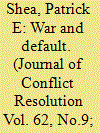

|
|
|
|
|
| Summary/Abstract |
Sovereign borrowing is often used to cover the costs of war. This borrowing, coupled with war’s economic disruptions, strains states’ ability to honor debt promises. Contrary to conventional expectations, however, we find that default is not common after wars. To explain the relationship between war and sovereign default, this article lays out a selection effect argument: war participants are unlikely to default in the first place, while states likely to default are unable to acquire the financing necessary to fight a war. In sum, states that lack the financial means to adequately borrow avoid paths to war. After offering some examples of the selection mechanism at work, we present evidence that states unlikely to default will avoid entering the war sample. Our findings have implications for the inferences researchers make about war finance and war onset.
|
|
|
|
|
|
|
|
|
|
|
|
|
|
|
|
| 8 |
ID:
161604
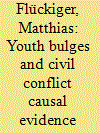

|
|
|
|
|
| Summary/Abstract |
The presence of an exceptionally large youth population, that is, a youth bulge, is often associated with an elevated risk of civil conflict. In this article, we develop an instrumental variable approach in which the size of the youth cohorts in Sub-Saharan Africa is identified using variation in birth-year drought incidence. Our results show that an increase in the size of the population group aged fifteen to nineteen raises the risk of low-intensity conflict. A 1 percent increase in the size of this age-group augments the likelihood of civil conflict incidence (onset) by 2.3 (1.2) percentage points. On the other hand, we do not find any association between the size of the two adjacent youth cohorts, that is, the population groups aged ten to fourteen and twenty to twenty-four.
|
|
|
|
|
|
|
|
|
|
|
|
|
|
|
|
|
|
|
|
|